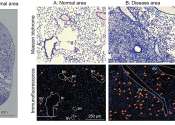Unlocking the secrets of lung fibrosis with a new mouse model
A RIKEN-developed mouse model of an enigmatic lung disease promises to unlock new biological insights and catalyze the development of treatments for millions affected globally. The research is published in Nature Communications.
Mar 5, 2024
0
6








